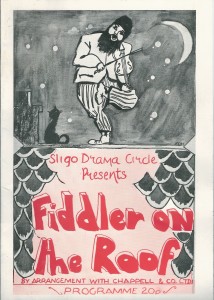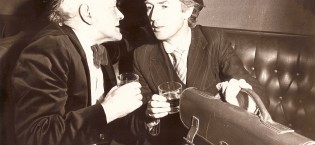Fiddler Brought Down The Roof
 A willingness to make allowances is definitely one of the best ways to guard against disappointment. One should always be prepared to look on anything produced voluntarily by local individuals and groups with a kind, sympathetic and understanding eye. Stage productions at a local level are a case in point. Those involved are one’s neighbours – people drawn from our community who have jobs to do, roles to play within families and very often, little or no hard and fast experience of theatrical capers. So, when one can avail of alternative entertainment to the cinema, the pub and the blessed television, and the substitute happens to be a local drama production, one goes along with an open heart. Understanding allows one to accept as normal, Sligo stage accents, nervous actors sometimes running out of lines and standing petrified waiting for the prompt to come, half drawn curtains being brought the rest of the journey by a zealous stage hand, and such like. It was with these thoughts that we went along to Sligo Drama Circle’s version of Fiddler on the Roof. But how unnecessary our readiness to allow for the ‘amateur’ content of The Fiddler proved to be. To call it a ‘professional production’ would not do it justice – such a verdict excludes room for the electric enthusiasm of people making their stage debut which certainly was a feature of the Drama Circle venture. It really was a magnificent spectacle from start to finish, and deceased members of the Circle, looking down from the balconies of heaven must, most definitely, have been thoroughly pleased.
A willingness to make allowances is definitely one of the best ways to guard against disappointment. One should always be prepared to look on anything produced voluntarily by local individuals and groups with a kind, sympathetic and understanding eye. Stage productions at a local level are a case in point. Those involved are one’s neighbours – people drawn from our community who have jobs to do, roles to play within families and very often, little or no hard and fast experience of theatrical capers. So, when one can avail of alternative entertainment to the cinema, the pub and the blessed television, and the substitute happens to be a local drama production, one goes along with an open heart. Understanding allows one to accept as normal, Sligo stage accents, nervous actors sometimes running out of lines and standing petrified waiting for the prompt to come, half drawn curtains being brought the rest of the journey by a zealous stage hand, and such like. It was with these thoughts that we went along to Sligo Drama Circle’s version of Fiddler on the Roof. But how unnecessary our readiness to allow for the ‘amateur’ content of The Fiddler proved to be. To call it a ‘professional production’ would not do it justice – such a verdict excludes room for the electric enthusiasm of people making their stage debut which certainly was a feature of the Drama Circle venture. It really was a magnificent spectacle from start to finish, and deceased members of the Circle, looking down from the balconies of heaven must, most definitely, have been thoroughly pleased.
Joseph Steun’s Fiddler on the Roof is by no means the perfect musical. ‘If I were a Rich Man’ apart, it does not have the infectious songs one is liable to pick up and go around whistling unknown to oneself, as happens after a viewing of Oaklahoma, My Fair Lady, The Sound of Music or Evita. Story-wise, the Fiddler is sometimes patchy. There’s too great a contrast between the first and second acts. Whereas the opening one is light and frivolous with precious little hint of seriousness, the second is much more grim and true to life. Another major fault in the three-hour musical is its absence of anywhere near well-developed characters. Apart from a handful of parts, the task of making any real impression on the audience rests fairly and squarely on the shoulders of the actors and actresses. All these factors combined to lay down a firm challenge for the Drama Circle and the call was answered supremely well. The seeds of success were sewn in the beginning: little things like the acquisition of an accordeon for the orchestra. A staff including organising secretaries, a press and publicity department and a business committee was also set up; someone even had the foresight to see that a Social Club would be organised for the Grand Hotel after each night’s production
In those very early days too the casting was completed and this was a task which demanded meticulous attention because of the nature of The Fiddler show. People like Paddy Dooney (Mordcha) who proved to be a spirited dancer as well as a shrewd innkeeper, Mick Kilcoyne (Rabbi), Lionel Gallagher (Mendel), Martin Mc Dermottroe (Fyedka), Liz Mc Elhone (Grandma) and Mary Matthews (Shande) played their parts with such excellence that they made characters out of what might just have been names. The choice and arrangement of the chorus was another factor vital to the success of the production. On the opening night when we found ourselves in the unusual position of being seated among the guests, we feared the neighbours might be a little too genteel. Yet once the chorus made their early entry the quality of the singing where the voice of Frances Monaghan sounded particularly well, was so powerful and impressive, the audience had no option but to burst into generous applause. In fact, the County Manager, a man knowledgeable on so many affairs, and who was sitting in the second row, was the cheer-leader who showed us all the way!
From once the show began t never sagged. The production was lined with the subtle crafts of the off-stage personnel. There was, for example, the orchestra and stage and lighting design crew combining to create a distinct sense of the atmosphere at the lighting of the candles scene during the Sabbath Supper. Then came the hand of the master producer Liam Mc Kinney when he held the audience spellbound, creating eeriness during the dream scene in Tevye’s bedroom, complete surprise when the marriage of Tzeitel and Motel was broken up and sympathy when both Hodel and Chava and then the entire family had to leave the village. Kieran Hickey (Tevye) could have been frightened by the knowledge that ass the lead character he had the potential to damn or make the show. One went to the Town Hall with the knowledge that Kieran was the brother of The Riordan’s character Benji. From now on we will think of Benji as Kieran’s brother.The example given by the lead must have been an inspiration to those around him. Technical qualities like the accent, the movements, the singing and timing were measured to perfection. Tevye was portrayed as an understanding and loving father, a husband wise to his wife’s ways, a respected member of the village.
Joan Fitzpatrick’s portrayal of Golde (the wife of Tevye) was equally impressive. For a Russian Jew who mothered five handsome daughters, she also looked remarkably well! Like her husband, she suggested there were several sides to her – the audience saw Golde, the henpecker; Golde, the understanding mother who accepted her daughter’s marriage outside the fold; Golde, the woman frightened of dreams and evil spirits and Golde, the loving wife after 25 years of marriage. That passage where the husband questioned his wife about her love for him was perhaps the most captivating one of the entire play. Humour, disappointment, impatience and love were delicately interwoven by the two characters. All five daughters bore resemblance to their parents. Martina Cullen (Tzeitel), a most promising talent for musical productions, had most in common with the mother. She had a fitting husband in Tony Mc Niffe (Motel) whose singing was unsurpassed during the show. Rita Barr (Hodel), a young girl with a great family tradition in music and drama, exuded confidence. Her experiences with the Bunratty Singers certainly serves her well and her sortis with Damien Brennan (Perchik) were as amusing as they were realistic. As Perchik, the radical schoolteacher with so many new ideas who eventually falls victim to the oldest curse in the history of mankind, love. Damien had a difficult task. But he played the part with great understanding and conviction.
Different talents were sought from Sheila Horan (Chava), the third daughter who was destined to elope with the non-Jewish Fyedka (Martin Mc Dermottroe). She had to come across as the most loved daughter of all, a task all the more formidable as a result of her absence of lines, but the fragile, tender interpretation which Sheila succeeded in getting across stamped a real mark of quality on her contribution. The remaining two daughters, Jackie Lane (Shprintle) and Felicity Hynes (Bielke) also kept the family flag flying. Kieran Kelly (Lazar Worfe) is someone we’re not used to seeing in Drama Circle’s productions. At times he tended to be the show’s only villain, apart from a most forceful Constable (Tony Kavanagh – on the particular night) but like so many of the new faces in the Circle, not only did he seem at home on the stage, he also appeared to be thoroughly enjoying himself.
The whole night smacked of excellence, from make-up and lighting, to choreography by Pat Verdon, stage management and house management right through to the acting, the orchestra with Sheila Crowley as conductor, the music which was the responsibility of Kathleen O’ Hara, and what his lordship Bishop Conway described as the masterful production of Liam Mc Kinney, it was marvellous to see so many people involved – there were, for example, two generations of Burns and the Blennerhassetts in the orchestra – and if one can learn any lesson from The Fiddler, it is the wealth of talent that exists within this community, all of which can be properly harnessed and used to create many happy memories. Congratulations and genuine thanks are extended to all those involved.
from The Western Journal, by Tommy Gorman, January 26th, 1979
Tags: History, Musical, Press Reports, Productions, Reviews







